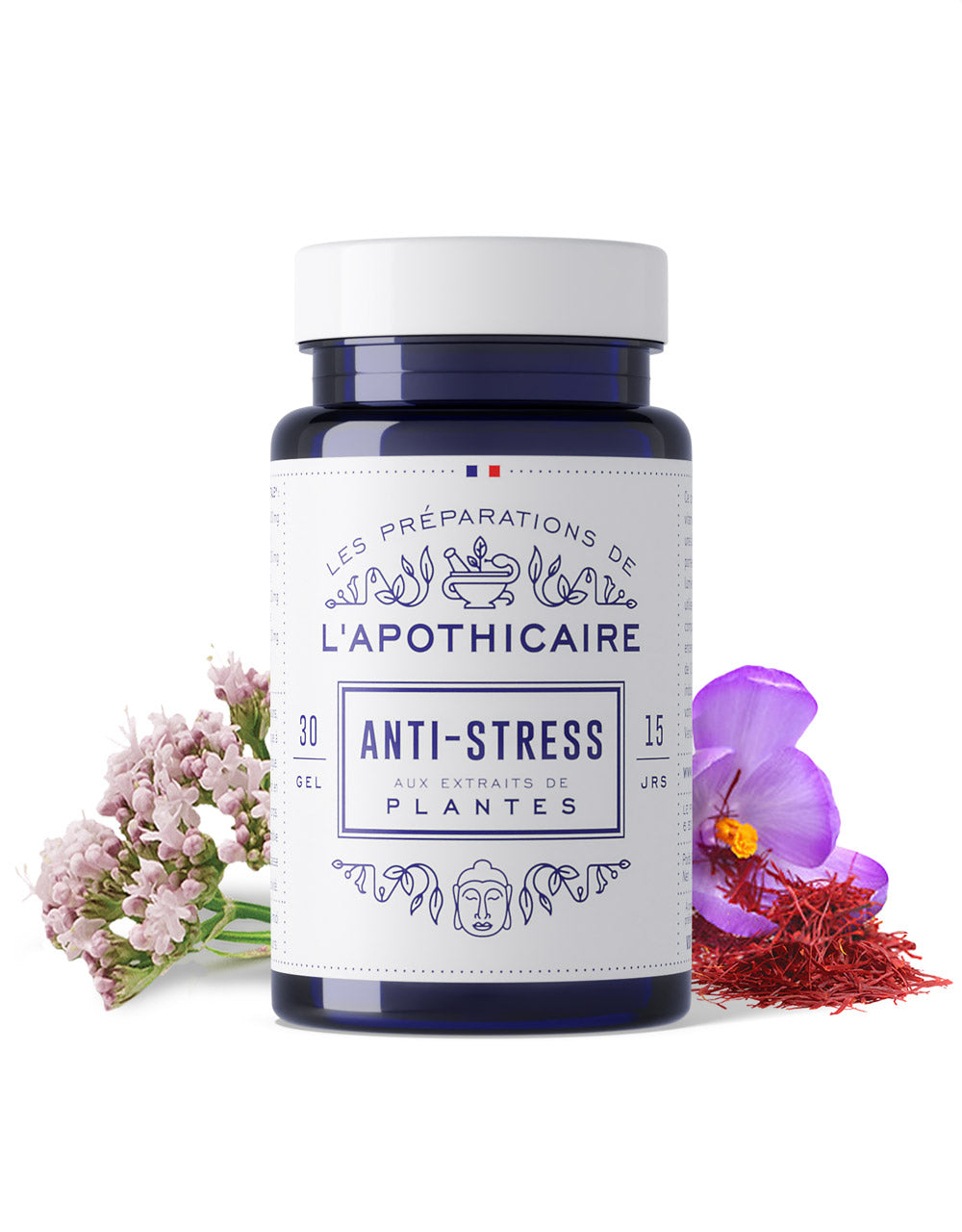The link between stress and the immune system is an increasingly studied topic, due to the often harmful effects stress can have on overall health.
As the body's defense mechanism, the immune system plays a fundamental role in protection against infections and diseases.
However, when subjected to high and prolonged levels of stress, its capabilities can be compromised, making the body more vulnerable to disease.
This article explores the effects of stress, whether acute or chronic, on the immune system, and offers practical solutions to better manage stress and thus strengthen our natural defenses.
- What is the immune system?
- What are the impacts of stress on the immune system?
- 6 Tips to Regulate Stress to Improve the Immune System
What is the immune system?
The immune system is the body's set of defense mechanisms that protect the body against foreign agents, such as bacteria, viruses, fungi, and even abnormal cells, such as cancer cells.
It is a complex system that allows us to distinguish what is part of the body ("self") from what is foreign to it ("non-self"), and to respond appropriately to neutralize or eliminate potential threats.
It is divided into two parts:
- Innate immunity : an immediate and non-specific defense, with barriers such as the skin, cells that “eat” invaders (phagocytes), and an inflammatory response.
- Adaptive immunity : more specific and slower, it uses B lymphocytes to produce antibodies and T lymphocytes to attack infected cells. It has a memory, which allows a rapid response in the event of reinfection, as in vaccines.
The immune system can be affected by a number of sources, including stress.

What are the impacts of stress on the immune system?
Stress has a significant impact on the immune system, and these effects can be positive or negative depending on the type, intensity, and duration of the stress.
Acute (short term) stress
Acute stress, which is usually short-lived, can have positive effects on the immune system . For example, when faced with an immediate threat, such as physical danger or a short-term stressful situation, the body releases hormones such as adrenaline and cortisol. This leads to a temporary activation of the immune system. This response can:
- increase the production of immune cells such as lymphocytes, which are essential for fighting infections.
- improve the effectiveness of the short-term immune response , promoting a better response to immediate infections or injuries.
Chronic (long term) stress
When stress becomes chronic, its effects on the immune system are usually negative . Chronic stress is often caused by prolonged life situations or ongoing emotional problems, such as job strain, financial difficulties, or stressful relationships.
Here are the main effects:
- decreased immunity : Cortisol, when released in excess over a long period of time, inhibits certain functions of the immune system, including the production of certain immune cells such as T and B lymphocytes . This weakens the body's response to infections and diseases.
- increased infections : People exposed to chronic stress are more vulnerable to viral infections (such as colds, flu) and bacterial diseases because their bodies are less effective at fighting pathogens.
- Excessive inflammatory response : Chronic stress can also lead to an excessive inflammatory response in the body. This is linked to an uncontrolled production of cytokines , molecules that promote inflammation. The development of chronic inflammatory diseases such as arthritis, diabetes or heart disease is therefore more risky.
- Slowed wound healing : Chronic stress also slows the body's ability to heal wounds, by decreasing the initial inflammatory response and the production of growth factors needed for healing.
Change in immune composition

Under chronic stress, some immune functions may be exacerbated while others are inhibited. This can alter the balance between different cells of the immune system , including lymphocytes, macrophages, and cytokines, creating an imbalance.
For example :
- increased allergic reactions : by altering the regulation of cells involved in the allergic reaction, chronic stress can exacerbate allergy symptoms.
- Autoimmune diseases : Chronic stress can also increase the risk of autoimmune diseases, where the immune system begins to attack healthy cells in the body.
Stress and susceptibility to disease
Chronic stress is correlated with an increased risk of several diseases , including:
- cardiovascular diseases : chronic inflammation induced by stress promotes the development of atheromatous plaques in the arteries.
- Metabolic diseases : Chronic stress can also disrupt metabolism, increasing the risk of type 2 diabetes and metabolic syndromes.
- Cancers : Although the link between stress and cancer is complex , some studies suggest that stress may weaken the body's ability to detect and eliminate precancerous cells. But be careful, this information should be taken with a grain of salt.
Psychological immunosuppression
Finally, stress also has an indirect impact via behaviors that are harmful to health . People under chronic stress tend to adopt behaviors such as:
- poor diet,
- excessive consumption of alcohol or tobacco,
- a decrease in physical activity,
- poor sleep.
But what can you do to regulate your stress and your immune system? Don't worry, there are solutions.
6 Tips to Regulate Stress to Improve the Immune System
Use of adaptogenic plants
Adaptogens are plants that help the body better cope with stress while supporting the immune system . Here are some that are particularly effective:
- Ashwagandha : This herb is well known for its cortisol (the stress hormone) reducing properties. In addition to helping with stress management, it also has immunomodulatory effects, helping to balance the immune system.
- Rhodiola : It is an adaptogenic plant that helps combat fatigue caused by stress, while improving the body's resistance to physical and mental stress. It also has properties that support the immune system.
- Holy Basil (Tulsi) : Used in Ayurvedic medicine, Holy Basil is known for its anti-inflammatory and anti-stress properties. It helps regulate cortisol levels and supports overall immunity.
- Korean Ginseng : Korean Ginseng is another adaptogenic herb that helps boost immunity while reducing stress-related fatigue.
- Eleutherococcus : This plant helps increase mental and physical endurance in response to stress, while stimulating the immune system.

Protect your immune system with our anti-stress capsules!
Our formula based on natural ingredients reduces fatigue and soothes tension
Discover the anti-stress capsules!Stress management techniques
- Meditation and mindfulness : Practicing meditation or mindfulness daily can reduce cortisol levels, which helps regulate the immune response. These techniques help build resilience to stress.
- Deep breathing : Techniques like cardiac coherence or diaphragmatic breathing quickly reduce stress by activating the parasympathetic nervous system, which decreases stress-related inflammatory responses.
- Yoga and moderate exercise : Yoga combines postures with breathing, which promotes relaxation and stress reduction, while strengthening the immune system. Moderate exercise, such as brisk walking, can also boost endorphins while reducing cortisol.

Optimization of food and nutrients
- Essential vitamins and minerals : To support immunity, it is important to ensure adequate intake of vitamins and minerals. Vitamin D, in particular, is essential for a good immune response, as are vitamin C, zinc, and selenium.
- Anti-inflammatory foods : Incorporating antioxidant-rich foods like berries, leafy greens, and nuts can help reduce stress-related inflammation. Omega-3s, found in oily fish and flaxseeds, also boost the body's natural defenses.
- Probiotics : Fermented foods (yogurt, kefir, sauerkraut) and probiotic supplements help maintain a healthy microbiota, which indirectly supports the immune system.
Improved sleep
Chronic stress often disrupts sleep, and insufficient sleep can weaken the immune system.
Remember to aim for 7 to 9 hours of quality sleep each night .
Good sleep allows the body to produce cytokines , proteins important for a good immune response.

Reduction of stimulants
- Limit caffeine : Excessive caffeine consumption can disrupt sleep and increase stress levels. Replacing coffee with soothing herbal teas, such as chamomile or peppermint, can help calm the nervous system.
- Reduce alcohol : Alcohol can impair sleep and weaken the immune system. Moderate or reduced consumption is recommended to minimize its harmful effects.
Creating a Daily Routine
- Structure your day : having a well-organized routine, with breaks to relax and regular physical activities, helps manage stress more effectively. In addition, even if screens are omnipresent, it is important to disconnect from them regularly and prioritize moments of relaxation.
- Social connection : Maintaining social relationships can help reduce stress and support emotional well-being. These connections have a positive impact on the immune system.
In conclusion, although stress is a natural and sometimes beneficial reaction in the short term, its long-term impact can significantly weaken the immune system.
Fortunately, by adopting stress management strategies, it is possible to protect and strengthen our immunity.
By incorporating these solutions into our daily lives, we can not only alleviate the negative effects of stress, but also improve our overall well-being and prevent many diseases.







